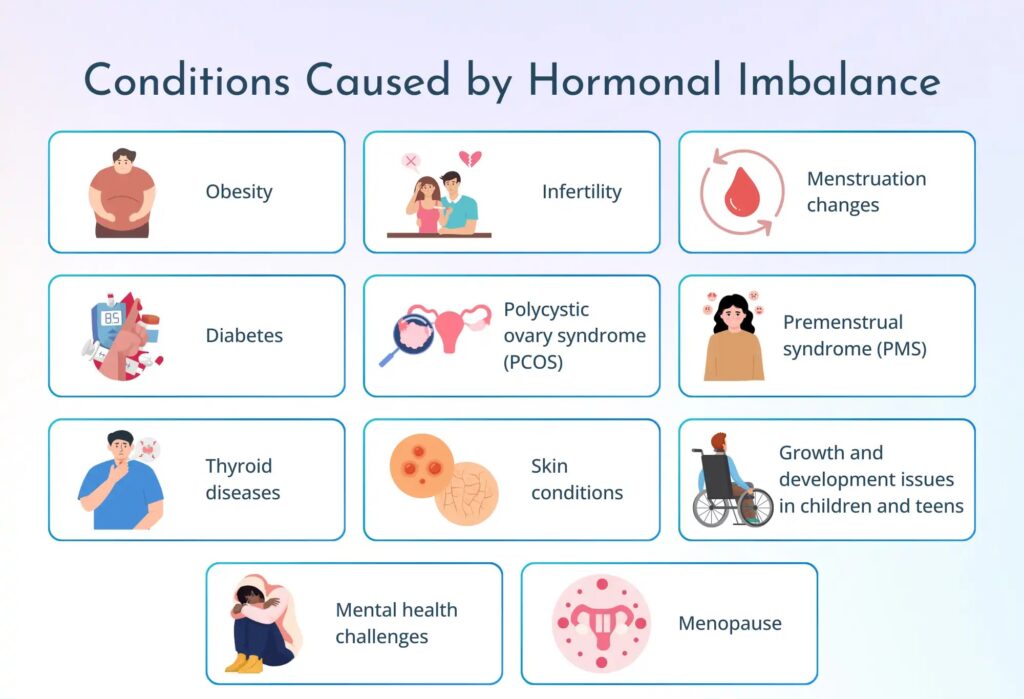Hormonal imbalance can lead to a variety of health issues, many of which may not be immediately apparent. Common diseases linked to hormonal imbalance include conditions like hypothyroidism, diabetes, and PCOS. In this post, we’ll explore the range of diseases that can arise due to hormonal imbalances, setting the stage for future posts that go deeper into each condition. For further reading on how hormones impact health, visit this insightful article from Healthline.
What is Hormonal Imbalance?
Hormones play a crucial role in regulating your body’s systems, from metabolism to mood. When these hormones are out of balance, whether too high or too low, the body can’t function properly. Hormonal imbalances can be caused by stress, poor diet, medical conditions, or lifestyle factors. check out our detailed post on Hormonal Imbalance.
“Common Diseases Linked to Hormonal Imbalance”
While hormonal imbalances can affect anyone at any stage of life, they can increase the risk of developing several conditions. Let’s take a brief look at some of these:
- Hypothyroidism
An underactive thyroid can slow down your metabolism, causing fatigue, weight gain, and other symptoms. This condition occurs when the thyroid gland doesn’t produce enough thyroid hormones. - Hyperthyroidism
On the opposite end, an overactive thyroid (hyperthyroidism) speeds up your metabolism, potentially leading to rapid weight loss, anxiety, and irregular heartbeats. - Polycystic Ovary Syndrome (PCOS)
PCOS is one of the most common hormonal disorders among women, affecting their reproductive health, menstrual cycle, and physical appearance. - Diabetes
Imbalances in insulin, a hormone produced by the pancreas, can result in diabetes, a condition where the body struggles to manage blood sugar levels. - Cushing’s Syndrome
Excessive cortisol, the body’s stress hormone, can lead to Cushing’s syndrome, characterized by weight gain, high blood pressure, and skin changes. - Adrenal Insufficiency (Addison’s Disease)
This condition results from the adrenal glands producing insufficient cortisol, causing fatigue, weight loss, and other symptoms. - Infertility
Hormonal imbalances can affect reproductive health in both men and women, making it difficult for them to conceive. - Growth Disorders
Imbalances in growth hormone during childhood or adulthood can result in abnormal growth, either too much (gigantism) or too little (dwarfism). - Mood Disorders
Hormones like cortisol, serotonin, and dopamine influence mood regulation. Imbalances in these hormones can lead to mood swings, depression, and anxiety. - Menstrual Irregularities
Women with imbalanced estrogen and progesterone levels may experience irregular, heavy, or painful periods.

Conclusion: Hormonal Imbalances Affect Every Aspect of Health
Hormonal imbalances can manifest in many different ways, impacting your energy, mood, reproductive health, and more. While this post provides a brief overview of some common conditions related to hormonal imbalances, we will dive deeper into each one in upcoming posts.
Stay tuned as we explore these conditions in more detail and discuss how Ayurveda and holistic practices, such as those offered by Jeevan Jyoti Ayurveda, can help restore balance.

[…] Hormonal imbalances, such as those involving growth hormone deficiencies. Learn more about Hormonal imbalances. […]